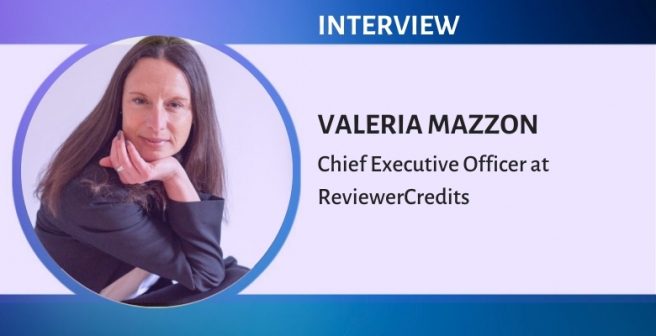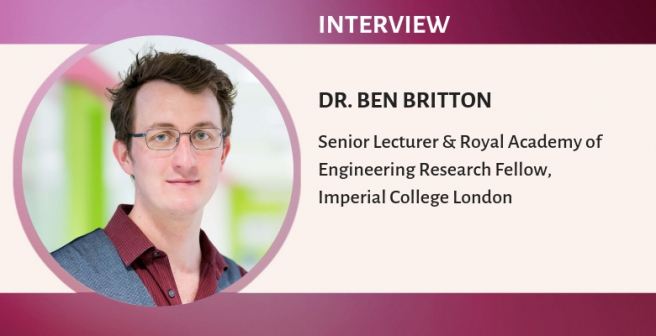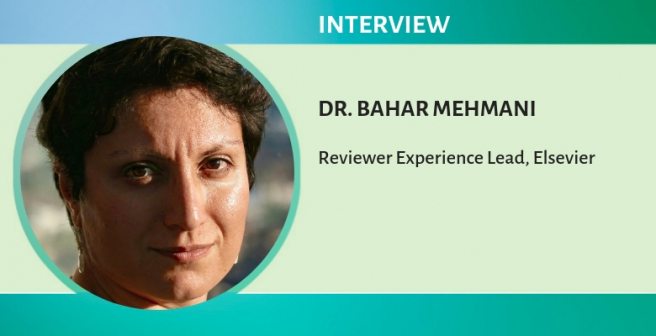ReviewerCredits: Bringing about positive disruption in scholarly publishing

I am in conversation with Valeria Mazzon, Chief Executive Officer of ReviewerCredits, a start-up company that aims to provide rewards and recognition for peer reviewers in the form of certification. Valeria is a professional with solid managerial and commercial experience in multinational companies and advertising agencies, She has over 20 years’ experience in the Marketing & Communication sector, most of which in the digital field. Before joining ReviewerCredits as Chief Executive Officer, Valeria led the tech company Adform Italy as Country Manager and took on managerial roles at Yahoo! Italy for over 10 years. Valeria graduated in Political Science at the University of Milan and went on to obtain her Masters in Corporate Communication.
Here, I speak to Valeria about the idea behind ReviewerCredits, what it does, and how it supports the cause of peer review. She also talks about the ReviewerCredits community and what it needs.
Could you tell us more about ReviewerCredits? How did the idea for ReviewerCredits develop? What is your mission?
ReviewerCredits is an independent start-up and a spin-off of the Milano-Bicocca University and was born from the idea of professors Giacomo Bellani and Robert Fruscio who, like millions of scientists worldwide, contribute to scientific research by participating in the peer-review process. In the course of their experience as researchers, university professors, as well as authors and reviewers, professors Bellani and Fruscio found themselves faced with the reality (at the time) that peer review does not get recognized and rewarded (even if scientists explicitly ask that the services they render voluntarily towards peer review be certified and valued).
The peer review process has not undergone many changes since its introduction in 1800: it remains the primary method adopted internationally to avoid the publication of unverified, inaccurate, incomplete, or even fake information. Furthermore, the peer review mechanism is not likely to undergo drastic change in the coming years. In the face of diversified research funding and increased activity from universities in emerging countries, publication volumes will grow exponentially. As a result, scarcity of peer reviewers as well as the need to engage reviewers and gain their loyalty will continue to pose challenges. At ReviewerCredits, our mission is to bring about positive disruption in scholarly publishing with the introduction of peer review certification and the first virtual credit system in the academic field.
In this context, in 2017 the two founders launched ReviewerCredits as an innovative start-up with the aim of creating a platform that would enable referees to obtain a solid certification for their peer review activity and conference/webinar talks. The idea was for them to be able to include this certificate in their resumes to gain visibility for their work, advance in their careers, and accumulate virtual credits that they could spend on the platform. In parallel, ReviewerCredits also allows publishers to find reviewers to whom they can entrust the scientific article review process.
So how does ReviewerCredits work?
Our platform offers scientists, who register for free, a certificate for their contribution to the peer review process and tangible recognition in the form of “virtual credits” that can be used up in our e-commerce store.
All researchers have to do is to sign up on ReviewerCredits and register their peer reviews – what we refer to as claiming a review. Claiming a review is a simple process. Once users create their free account, they can easily get access to their personal profile page and dashboard to start registering their reviews. They can log in with their ORCiD ID, LinkedIn, Google, or Twitter account. Naturally, they need to provide some basic information (e.g., journal name, publisher name and email, manuscript ID, etc.) and we offer a 24-month timeframe for them to claim the peer reviews they have completed. Each confirmed review in turn feeds a personal Reviewer Index, which is displayed on the website and visible to our audience of journals, publishers, peer reviewers, researchers, and institutions.
ReviewerCredits takes up the responsibility of contacting the journal editorial office to confirm each review. Although claims are usually processed within 24 hours, the whole process could take slightly longer, as the confirmation process depends on journal editorial offices and their response times may vary. Once the claimed reviews have been confirmed, ReviewerCredits assigns credits for each confirmed review performed for any journal, and credits can be spent on purchasing discounted subscriptions to scientific publications, accessing online training offers, or fulfilling APC requirements of open access publications. Users can also convert their credits into green credits, to be donated to sustainability initiatives related to the concept of Sustainable Reviews.
And of course, users can download a peer-review certificate, which serve as proof their activity as a peer reviewer. So far, the peer review activity itself has had very little visibility, so this is a huge step towards reviewer recognition. The certificate validates a researcher’s activity as reviewer and can be added in the resume or be shared on personal or institutional websites.
How do journals stand to benefit by using ReviewerCredits?
We guarantee free registration on the platform to scientists and researchers, while we offer a paid registration to scientific Journals with three types of annual subscription – Free, Plus and Premium.
Our service give journals and publishers access to our peer reviewer database, to the virtual credit system, and to qualitative and quantitative certification metrics. It also facilitates the peer review process – we are aware that it is not easy for journal editors to find suitable peer reviewers for manuscripts. We believe that by rewarding reviewers, we will be able to increase their motivation levels and inclination to accept peer review invitations. This in turn will make the manuscript evaluation process smoother and expedited.
In a nutshell, we facilitate editors in their search for reviewers to whom they can entrust the evaluation of potential articles for their journal. This is an important advantage, considering how difficult it is for journal editors to find and recruit scientists available to take on peer review task. This, we believe, is ReviewerCredits’ contribution towards fostering quality in scientific information, and ultimately, towards reducing delays and rejections thereby improving the efficiency of the publishing process.
How can conferences make the most of ReviewerCredits?
Most scientists are actively engaged in scientific dissemination. They are selected to give talks on specific topics for their expertise, thus improving their ability and skills to present literature, data, or innovative research in a straightforward and engaging way. Our platform also certifies conference and webinar talks and helps our users keep track of their conference talks, thus showcasing their science communication skills and achievements. The process is the same as that followed by users for claiming peer review credits. The conference certificates can be added to individual resumes too.
Could you elaborate how the reviewer’s indexing score works?
Currently, the ReviewerCredits reviewer index takes into account the numbers of peer reviews performed by each individual. We are aware that this sounds a bit simplistic; nevertheless, given how there’re very few players in the area of reviewer recognition, this is already a paradigm shift. At the same time, it goes without saying that quality will trump quantity and hence, we are working with external consultants, who are leading experts in the field, to implement additional parameters that would help us account for the “quality” of the peer reviews being registered on the platform.
It’d be interesting to hear what some of your users have had to say about the system. Could you please share any interesting user experiences?
Although still in the start-up phase, the platform is active and has 10,000 registered profiles, 600 journals, and 12,000 completed peer reviews. 75% of the completed peer reviews have been successfully processed and 5% have been identified as fake peer-reviews and declined by journals. The certification is the main attraction of ReviewerCredits and this is what the scientists are asking for. We have lots of fans and supporters: several scientists are looking at ReviewerCredits as a platform that does not just talk about the issues in peer review but also actively helps resolve them! They want to feel and be part of a community that shares a common goal and they want to build a trustworthy scholarly publishing environment together with us.
What, in your view, are some of the biggest peer review related challenges we are faced with today?
The number of scientific papers written, submitted, and published is continually on the increase, and some papers have modest quality outcomes and therefore a solid peer-review process is vital. The availability of reviewers remains the greatest challenge. It has been shown that only 10% of the scientists in the world review 90% of the papers. This is unfair and so inefficient! This is the reason why our vision is so disruptive: we want to fill the gap of the lack of recognition and reward for peer reviewers. We have understood the need to bridge this technological gap and we position ReviewerCredits on the market as an innovative product. Using AI, we provide an API connection to other platforms, such as editorial management platforms and databases of other research products. We also provide exclusive access to our pool of reviewers – this directly opens up a potential recruitment base for journal editors who may be struggling with the scarce peer reviewer problem. We are just at the beginning of a long journey, but we are clear about the path we are following!
What kind of support do you think reviewers need today? And where could they find this support?
Of course peer reviewers need support, to be able to provide the peer review service to the best of their ability. For instance, education both on peer review and the topics they need to review. So peer reviewer training would help them pick up the best practices of peer review, while improving their knowledge about various topics in their field will help them provide more informed comments during their reviews. Most importantly, I feel that peer review activity should actually count in the academic career – academics are measured, so to speak, in terms of their production or output and peer review should be added to the list of measurable aspects of a reviewer’s life.
Peer reviewers also need support in terms of motivation. We must not forget that most reviewers agree to taken on peer reviews voluntarily and this commitment is an addition to their academic and professional responsibilities. We should be able to answer the question that reviewers might often ask themselves: “Why should I invest my time doing peer reviews of other people’s articles? It does not bring anything to me and the company/institution I work at. On the contrary, it’s time consuming and distracts me from my responsibilities. Peer review activity is a high-value consultancy I offer for free.”
Peer reviewers need gender equity, as currently there’s still a kind of prejudice towards women in peer-review and also transparency, as frauds or clearly badly reviews should be identified and not taking into account for future peer-reviews.
ReviewerCredits also does its bit in supporting reviewers. We are constantly in touch with our reviewer community. We have also instituted a National Ambassador program, where we invite users to become national ambassadors and take on the responsibility of providing information, insights, and suggestions to their fellow ReviewerCredits users. We also recently interviewed 300 reviewers from over 23 countries to capture their sentiments toward peer review and gather information about the concept of a credit system as a reward for peer review. Our survey results show a strong interest in certification for peer review and we’re not surprised. Those are the gaps we recognized and that we aim to fill. The sentiment toward rewarding peer review is positive and considered as merited. Our survey results also show a particular preference for rewards such as special fees for participation in conferences and paid events, discounts on training courses and editing service, and gift cards. We are open to partnerships and collaborations to provide our reviewer community with the items they identified as ideal to reward their peer review activity.
This year, during Peer Review Week 2020, we’re all talking about Trust in Peer Review. How does ReviewerCredits foster trust in peer review?
ReviewerCredits’ philosophy is based on trust, transparency, and mutual reliability, and this philosophy is independent of large groups and economic interests, which safeguards our objectivity. We are member of COPE and ORCiD and are supporters of PEERE. ReviewerCredits has been founded to increase fairness and to create standards in peer review recognition. One way in which we help foster trust in peer review is by verifying the reviews claimed by our users and we do this by directly checking with the journal. Also, ReviewerCredits does not accept “thank you” emails that journals send to peer reviewers, upon submission of a peer review as a proof that it has effectively been performed. Our process is robust and our goal to achieve the active involvement of journals in the process of certifying the work scientists do for free, and that is the only way verified and reliable science can be published!



